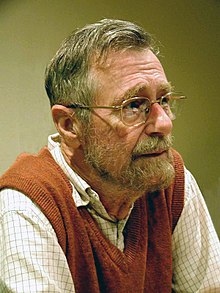艾茲赫爾·戴克斯特拉
外觀
(重新導向自Edsger W. Dijkstra)
| 艾茲赫爾·戴克斯特拉 Edsger Dijkstra | |
|---|---|
 | |
| 出生 | 1930年5月11日 |
| 逝世 | 2002年8月6日(72歲) |
| 公民權 | |
| 教育程度 | 萊頓大學(B.S., M.S.) 阿姆斯特丹大學(Ph.D.) |
| 知名於 | 戴克斯特拉演算法 結構化編程 THE 作業系統 訊號量(semaphore) |
| 配偶 | Maria (Ria) C. Debets |
| 獎項 |
|
| 科學生涯 | |
| 研究領域 | 電腦科學、理論電腦科學 |
| 機構 | 荷蘭數學和電腦科學研究學會 燕豪芬理工大學 寶來公司 德克薩斯大學奧斯汀分校 |
| 論文 | Communication with an Automatic Computer(1959) |
| 博士導師 | 阿德里安·范·韋恩加登 |
| 博士生 | 尼可·赫伯曼 揚·L·A·范·德·斯內普肖特 Netty van Gasteren David A. Naumann |
| 受影響自 | |
| 施影響於 | |
艾茲赫爾·韋伯·戴克斯特拉(荷蘭語:Edsger Wybe Dijkstra,荷蘭語:[ˈɛtsxər ˈʋibə ˈdɛikstra] (ⓘ),1930年5月11日—2002年8月6日),又譯艾茲赫爾·韋伯·迪傑斯特拉,生於荷蘭鹿特丹,電腦科學家,是荷蘭第一位以程式設計為專業的科學家。[9]他曾在1972年獲得圖靈獎,之後還獲得1974年AFIPS Harry Goode Memorial Award、1989年ACM SIGCSE電腦科學教育教學傑出貢獻獎。
2002年,在他去世前不久,獲得了ACM PODC(分散式計算原理)最具影響力論文獎,以表彰他在分散式領域中關於程式計算自穩定的貢獻。為了紀念他,這個每年一度獎項也在此之後更名為「Dijkstra獎」。
他曾經提出「GOTO有害論」,訊號量和PV原語(passeren vrijgeven),解決了「哲學家就餐問題」。
生平
[編輯]艾茲赫爾·韋伯·戴克斯特拉出生於鹿特丹,大學就讀於萊頓大學,研究理論物理學。[10][11]但他很快就發現自己的興趣是電腦科學。1980年代,擔任埃因霍溫理工大學教授。
2002年8月6日,戴克斯特拉在荷蘭尼嫩自己的家中與世長辭。終年72歲。
學術貢獻
[編輯]他的貢獻包括:
註釋
[編輯]- ^ Hoare, C.A.R. The 2010 Edsger W. Dijkstra Memorial Lecture: What Can We Learn from Edsger W. Dijkstra?. Department of Computer Science, The University of Texas at Austin. 12 October 2010 [12 August 2015]. (原始內容存檔於2022-03-21).
- ^ 參照錯誤:沒有為名為
Wirth2005的參考文獻提供內容 - ^ 參照錯誤:沒有為名為
Wirth2008的參考文獻提供內容 - ^ In his 2004 memoir, "A Programmer's Story: The Life of a Computer Pioneer", Brinch Hansen wrote that he used "Cooperating Sequential Processes" to guide his work implementing multiprogramming on the RC 4000, and described it saying, "One of the great works in computer programming, this masterpiece laid the conceptual foundation for concurrent programming."
- ^ Lamport, Leslie. 2002 PODC Influential Paper Award. ACM Symposium on Principles of Distributed Computing. 2002 [2020-09-22]. (原始內容存檔於2019-10-06).
Edsger W. Dijkstra started the field of concurrent and distributed algorithms with his 1965 CACM paper "Solution of a Problem in Concurrent Programming Control", in which he first stated and solved the mutual exclusion problem. That paper is probably why PODC exists; it certainly inspired most of my work.
- ^ 參照錯誤:沒有為名為
Lamport (2015)的參考文獻提供內容 - ^ Dolev, Shlomi: Self-stabilization. (Cambridge, MA: MIT Press, 2000) ISBN 978-0-262-04178-2
- ^ Lo Russo, Graziano (1997). An Interview with A. Stepanov (Edizioni Infomedia srl.). STLport.org. [21 December 2017]. (原始內容存檔於2009-03-04).
Alexander Stepanov: "...I also discovered books of two great computer scientists from whose work I learned the scientific foundation of my trade: Donald Knuth and Edsger Dijkstra. Knuth taught me the answers. Dijkstra taught me the questions. Time and time again I come back to their works for new insights."
- ^ Hoare, Tony. Obituary: Edsger Wybe Dijkstra. Physics Today. March 2003, 56 (3): 96–98 [2017-07-19]. doi:10.1063/1.1570789. (原始內容存檔於2016-08-31).
- ^ Edsger Wybe Dijkstra. Stichting Digidome. 3 September 2003. (原始內容存檔於6 December 2004).
- ^ O'Connor, J J; Robertson, E F. Dijkstra biography. The MacTutor History of Mathematics, School of Mathematics and Statistics, University of St Andrews, Scotland. July 2008 [18 January 2014]. (原始內容存檔於11 October 2013).
延伸閱讀
[編輯]- Apt, Krzysztof R. Edsger Wybe Dijkstra (1930–2002): A Portrait of a Genius. Formal Aspects of Computing. 2002, 14 (2): 92–98 [2018-04-03]. arXiv:cs/0210001
 . doi:10.1007/s001650200029. (原始內容存檔於2021-04-11).
. doi:10.1007/s001650200029. (原始內容存檔於2021-04-11). - Per Brinch Hansen. The Origin of Concurrent Programming: From Semaphores to Remote Procedure Calls. Springer. 2002 [2018-04-03]. ISBN 978-0-387-95401-1. (原始內容存檔於2021-04-11).
- M. Ben-Ari. Principles of Concurrent and Distributed Programming 2nd. Addison-Wesley. 2006 [2018-04-03]. ISBN 978-0-321-31283-9. (原始內容存檔於2021-04-11).
- Broy, M.; Denert, Ernst (編). Software Pioneers: Contributions to Software Engineering. Springer. 2002: 3 [2018-04-03]. ISBN 978-3-540-43081-0. (原始內容存檔於2021-04-11).
- Daylight, Edgar G. The Dawn of Software Engineering: from Turing to Dijkstra. Lonely Scholar. 2012. ISBN 9789491386022.
- Daylight, Edgar G. Dijkstra's Rallying Cry for Generalization: The Advent of the Recursive Procedure, Late 1950s–Early 1960s. The Computer Journal. 2011, 54 (11): 1756–72. doi:10.1093/comjnl/bxr002.
- Shlomi Dolev. Self-stabilization. MIT Press. 2000 [2018-04-03]. ISBN 978-0-262-04178-2. (原始內容存檔於2021-04-11).
- Feijen, W.H.J.; Gries, David (編). Beauty Is Our Business: A Birthday Salute to Edsger W. Dijkstra. Springer. 1990 [2018-04-03]. ISBN 978-0-387-97299-2. (原始內容存檔於2021-04-11).
- Laplante, Phillip A. Great papers in computer science. IEEE Press. 1996 [2018-04-03]. ISBN 978-0-7803-1112-1. (原始內容存檔於2021-04-11).
- Lee, J.A.N. Frontiers of Computing: A Tribute to Edsger W. Dijkstra on the Occasion of his 60th Birthday (PDF). Ann. Hist. Comp. 1991, 13 (1): 91–96 [2018-04-03]. (原始內容存檔於2021-04-11).
- O』Regan, Gerard. Giants of Computing: A Compendium of Select, Pivotal Pioneers. Springer. 2013 [2018-04-03]. ISBN 978-1-4471-5340-5. (原始內容存檔於2021-04-11).
- Payette, Sandy. Hopper and Dijkstra: Crisis, Revolution, and the Future of Programming. IEEE Annals of the History of Computing. 2014, 36 (4): 64–73 [2018-04-03]. doi:10.1109/MAHC.2014.54. (原始內容存檔於2021-04-11).
- Shasha, Dennis; Lazere, Cathy. Out of their Minds: The Lives and Discoveries of 15 Great Computer Scientists. Springer. 1998 [2018-04-03]. ISBN 978-0-387-98269-4. (原始內容存檔於2021-04-11).
外部連結
[編輯]維基共享資源上的相關多媒體資源:艾茲赫爾·戴克斯特拉
- E.W. Dijkstra Archive. Center for American History, University of Texas at Austin. [2018-04-03]. (原始內容存檔於2005-04-20).
- Dijkstra's Rallying Cry for Generalization. A site devoted to Dijkstra’s works and thoughts, created and maintained by the historian of computing Edgar Graham Daylight. [2018-04-03]. (原始內容存檔於2021-04-11).
